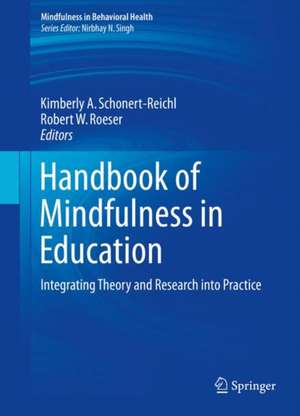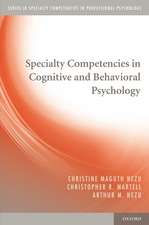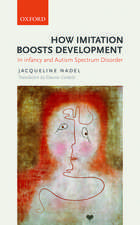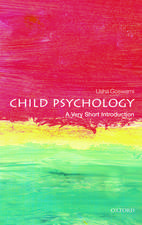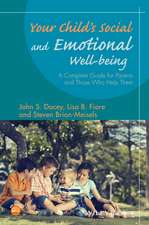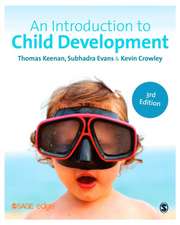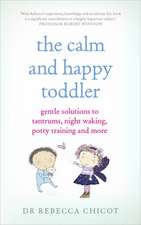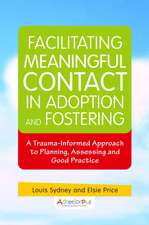Handbook of Mindfulness in Education: Integrating Theory and Research into Practice: Mindfulness in Behavioral Health
Editat de Kimberly A. Schonert-Reichl, Robert W. Roeseren Limba Engleză Paperback – 15 sep 2017
Featured topics include:
- A comprehensive view of mindfulness in the modern era.
- Contemplative education and the roots of resilience.
- Mindfulness practice and its effect on students’ social-emotional learning.
- A cognitive neuroscience perspective on mindfulness in education that addresses students’ academic and social skills development.
- Mindfulness training for teachers and administrators.
- Two universal mindfulness education programs for elementary and middle school students.
| Toate formatele și edițiile | Preț | Express |
|---|---|---|
| Paperback (1) | 900.94 lei 43-57 zile | |
| Springer – 15 sep 2017 | 900.94 lei 43-57 zile | |
| Hardback (1) | 1235.25 lei 43-57 zile | |
| Springer – mar 2016 | 1235.25 lei 43-57 zile |
Preț: 900.94 lei
Preț vechi: 1098.71 lei
-18% Nou
Puncte Express: 1351
Preț estimativ în valută:
172.45€ • 187.38$ • 144.95£
172.45€ • 187.38$ • 144.95£
Carte tipărită la comandă
Livrare economică 21 aprilie-05 mai
Preluare comenzi: 021 569.72.76
Specificații
ISBN-13: 9781493974955
ISBN-10: 1493974955
Pagini: 394
Ilustrații: XXVII, 394 p. 22 illus., 7 illus. in color.
Dimensiuni: 178 x 254 x 27 mm
Greutate: 0.73 kg
Ediția:1st ed. 2016
Editura: Springer
Colecția Springer
Seria Mindfulness in Behavioral Health
Locul publicării:New York, NY, United States
ISBN-10: 1493974955
Pagini: 394
Ilustrații: XXVII, 394 p. 22 illus., 7 illus. in color.
Dimensiuni: 178 x 254 x 27 mm
Greutate: 0.73 kg
Ediția:1st ed. 2016
Editura: Springer
Colecția Springer
Seria Mindfulness in Behavioral Health
Locul publicării:New York, NY, United States
Cuprins
Part I: Mindfulness in Education: Historical, Contemplative, Scientific, and Educational Foundations.- Chapter 1. Mindfulness in Education: Overview of the Handbook.- Chapter 2. Contemplation in Education.- Chapter 3. What is Mindfulness? A Contemplative Perspective.- Chapter 4. International Education and the Roots of Resilience.- Chapter 5. Mindfulness and Social-Emotional Learning.- Part II: Mindfulness in Education: Science and Applications with Educators.- Chapter 6. Mindfulness Training for Teachers.- Chapter 7. Teacher Stress and Mindfulness.- Chapter 8. Inner Resilience in Schools.- Chapter 9. Teacher Programs Overview and CARE Program.- Chapter 10. Teaching, Learning, and Transfer to a Mindfulness-Based Intervention for Teachers.- Chapter 11. Mindfulness Training with Special Populations.- Chapter 12. Preparing Teacher Candidates for the Present: Investigating the Value of Mindfulness-Training for Teacher Education.- Chapter 13. Embodied Presence: Contemplative Teacher Education.- Chapter 14. On Attentive Love in Education: The Case of Course to Teach.- Chapter 15. Mindfulness and Organizational Change.- Chapter 16. Mindfulness and Educational Leadership.- Part III: Mindfulness in Education: Science and Applications with Students.- Chapter 17. Developmental Social-Cognitive Neuroscience Perspective on Mindfulness in Education.- Chapter 18. Mindfulness and Compassion in Education.- Chapter 19. Mindfulness in Education During Early Childhood.- Chapter 20. MindUP: Mindfulness in Education During Childhood.- Chapter 21. The Master Mind and Movement Programs: Introducing Two Universal Mindfulness Education Programs for Elementary and Middle School Students.- Chapter 22. Working on the Inside: Mindfulness for Adolescents.
Notă biografică
Kimberly A. Schonert-Reichl is a Professor in the Human Development, Learning, and Culture program in the Faculty of Education at the University or British Columbia (UBC) and Director of the Human Early Learning Partnership, an interdisciplinary research institute in the Faculty of Medicine at UBC. She received her MA in Educational Psychology from the University of Chicago, her Ph.D. in Educational Psychology from the University of Iowa, and was a postdoctoral National Institute of Mental Health (NIMH) Fellow in the Clinical Research Training Program in Adolescence at the University of Chicago and Northwestern University. Prior to her graduate work, Kim was a middle school teacher and a teacher at an alternative high school for “at risk” adolescents. Kim studies the social and emotional development of children and adolescents, particularly in relation to identifying the processes and mechanisms that foster positive human qualities such as empathy, compassion, altruism, andresiliency. She has won several awards, including the 2015 Joseph E. Zins Distinguished Scholar Award for Outstanding Contributions to Research in Social and Emotional Learning, given by the Collaborative for Academic, Social, and Emotional Learning (CASEL) and the Confederation of University Faculty Associations’ (CUFA-BC) Paz Buttedahl Career Achievement Award for sustained contributions over the course of a career to the non-academic community through research and scholarly activity.
Robert W. Roeser is a Professor of Psychology and Human Development in the Department of Psychology at Portland State University in Portland, Oregon. He received his Ph.D. from the Combined Program in Education and Psychology at the University of Michigan (1996) and holds master's degrees in religion and psychology, developmental psychology and clinical social work. In 2005 he was a United States Fulbright Scholar in India; from 1999-2004 he was a William T. Grant Faculty Scholar; and from 2006 to 2010 served as the Senior Program Coordinator for the Mind and Life Institute (Boulder, CO). Currently, Dr. Roeser's Culture and Contemplation in Education Lab (CaCiEL) at Portland State is devoted to the study of the putative effects of mindfulness and compassion training for teachers and (early childhood and early adolescent) students with regard to health and wellbeing, and the optimization of teaching and learning.
Textul de pe ultima copertă
This handbook addresses the educational uses of mindfulness in schools. It summarizes the state of the science and describes current and emerging applications and challenges throughout the field. It explores mindfulness concepts in scientific, theoretical, and practical terms and examines training opportunities both as an aspect of teachers’ professional development and a means to enhance students’ social-emotional and academic skills. Chapters discuss mindfulness and contemplative pedagogy programs that have produced positive student outcomes, including stress relief, self-care, and improved classroom and institutional engagement.
Featured topics include:
- A comprehensive view of mindfulness in the modern era.
- Contemplative education and the roots of resilience.
- Mindfulness practice and its effect on students’ social-emotional learning.
- A cognitive neuroscience perspective on mindfulness in education that addresses students’ academic and social skills development.
- Mindfulness training for teachers and administrators.
- Two universal mindfulness education programs for elementary and middle school students.
The Handbook of Mindfulness in Education is a must-have resource for researchers, graduate students, clinicians, and practitioners in psychology, psychiatry, education, and medicine, as well as counseling, social work, and rehabilitation therapy.
Caracteristici
Defines mindfulness and its potential role as well as value-added effects in education Culls emerging research in mindfulness practices with children, adolescents, and emerging adults Chapter contributions from world-renowned experts Examines emerging theory on mindfulness, education, and human relationships Provides scientific and contemplative bases for the study of mindfulness in education Offers future directions for theory, research, and practice Includes supplementary material: sn.pub/extras
